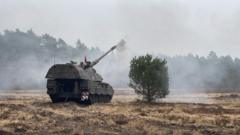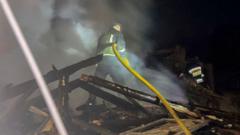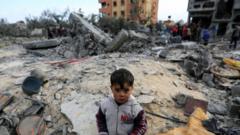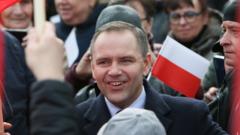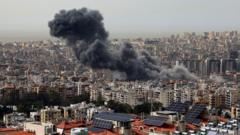Putin's suggestion raises concerns about delaying peace talks as the US attempts to broker a ceasefire in the ongoing war.
**Putin Proposes UN Administration in Ukraine Amid Ongoing Conflict**
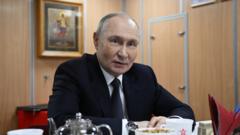
**Putin Proposes UN Administration in Ukraine Amid Ongoing Conflict**
Russian President suggests temporary UN governance as a means to facilitate elections and peace discussions.
In a recent statement, Russian President Vladimir Putin has floated the idea of placing Ukraine under temporary United Nations control to facilitate the establishment of what he branded a more “competent” government. This proposal marks a renewed effort by Putin to challenge the legitimacy of Ukraine's current leadership under President Volodymyr Zelensky.
Ukrainian officials have criticized the proposal, labeling it as "crazy" and an attempt to stall peace negotiations, which are being mediated by US President Donald Trump. The White House firmly stated that the governance of Ukraine should be determined by its own constitution and its citizens, reiterating that any decisions regarding Ukraine's future must come from the Ukrainian people.
Putin's comments arose as international stakeholders work towards negotiating a ceasefire in a conflict that has now entered its fourth year. On Tuesday, the White House announced that both sides had achieved a limited truce in the Black Sea region, though Russia's subsequent demands for the lifting of certain Western sanctions led to concerns about potential derailment of peace efforts.
While addressing crew members of a nuclear submarine in Murmansk, Putin indicated that discussions regarding a UN-led administration could be held with various international partners. He asserted that such a step could facilitate democratic elections and create a government that enjoys popular support, which would then engage in peace negotiations to finalize legitimate agreements.
Moscow has historically claimed that the Ukrainian authorities lack legitimacy, arguing that President Zelensky's extended rule beyond the end of his term invalidates him as a negotiating partner. However, Zelensky remains in power due to the enforcement of martial law and the ongoing chaos of the war. Calling for new elections amid the current crisis raises questions about the validity of such electoral processes, as millions of Ukrainians remain displaced and many others are serving on the front lines.
Putin emphasized that his suggestion was merely one of many possible scenarios, citing international examples such as East Timor and the former Yugoslavia where UN control previously took place. In response, Zelensky's chief of staff, Andriy Yermak, accused Russia of attempting to sidestep peace initiatives and maintaining the war.
Furthermore, a US national security representative reaffirmed the position that Ukraine's governance is a matter for its citizens and constitution, not external forces. During this same address, Putin asserted that Russia maintains “strategic initiative” on the battlefield, but despite claims of progress, military advancements remain minimal in securing territory in eastern Ukraine.
Putin's latest comments follow a recent summit in Paris where Zelensky convened with European allies, with French President Emmanuel Macron revealing discussions on establishing a "reassurance force" in Ukraine to support its sovereignty. The ongoing conflict, which began with Russia's full-scale invasion in February 2022, continues to pose significant challenges not only for Ukraine but for the broader international community.
Ukrainian officials have criticized the proposal, labeling it as "crazy" and an attempt to stall peace negotiations, which are being mediated by US President Donald Trump. The White House firmly stated that the governance of Ukraine should be determined by its own constitution and its citizens, reiterating that any decisions regarding Ukraine's future must come from the Ukrainian people.
Putin's comments arose as international stakeholders work towards negotiating a ceasefire in a conflict that has now entered its fourth year. On Tuesday, the White House announced that both sides had achieved a limited truce in the Black Sea region, though Russia's subsequent demands for the lifting of certain Western sanctions led to concerns about potential derailment of peace efforts.
While addressing crew members of a nuclear submarine in Murmansk, Putin indicated that discussions regarding a UN-led administration could be held with various international partners. He asserted that such a step could facilitate democratic elections and create a government that enjoys popular support, which would then engage in peace negotiations to finalize legitimate agreements.
Moscow has historically claimed that the Ukrainian authorities lack legitimacy, arguing that President Zelensky's extended rule beyond the end of his term invalidates him as a negotiating partner. However, Zelensky remains in power due to the enforcement of martial law and the ongoing chaos of the war. Calling for new elections amid the current crisis raises questions about the validity of such electoral processes, as millions of Ukrainians remain displaced and many others are serving on the front lines.
Putin emphasized that his suggestion was merely one of many possible scenarios, citing international examples such as East Timor and the former Yugoslavia where UN control previously took place. In response, Zelensky's chief of staff, Andriy Yermak, accused Russia of attempting to sidestep peace initiatives and maintaining the war.
Furthermore, a US national security representative reaffirmed the position that Ukraine's governance is a matter for its citizens and constitution, not external forces. During this same address, Putin asserted that Russia maintains “strategic initiative” on the battlefield, but despite claims of progress, military advancements remain minimal in securing territory in eastern Ukraine.
Putin's latest comments follow a recent summit in Paris where Zelensky convened with European allies, with French President Emmanuel Macron revealing discussions on establishing a "reassurance force" in Ukraine to support its sovereignty. The ongoing conflict, which began with Russia's full-scale invasion in February 2022, continues to pose significant challenges not only for Ukraine but for the broader international community.




